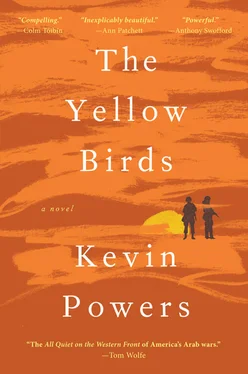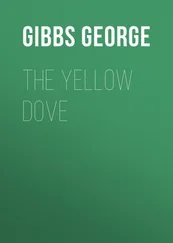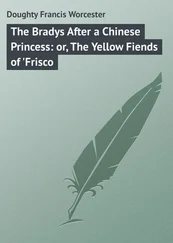I’d had this idea once that you had to grow old before you died. I still feel like there is some truth to it, because Daniel Murphy had grown old in the ten months I’d known him. And perhaps it was a need for something to make sense that caused me to pick up a pencil and write a letter to a dead boy’s mother, to write it in his name, having known him plenty long enough to know it was not his way to call his mother “Mom.” I’d known a lot, really. I’d known that snow comes early in the year in the mountains where Daniel was from, November, sure, and sometimes as early as October. But I only found out later that she’d read that letter with snow falling all around her. That she’d set it on the seat next to her while she mushed her old right-hand-drive Jeep up and down the switchbacks on her route, carving clean tracks through the white erasure that had fallen all throughout the night before. And that as she pulled down the long gravel path leading to their little house, on the winter-dormant apple orchard Daniel had talked about so often, she kept sneaking glances at the return address. She must have taken those glances with an unusual level of skepticism for a rural mail carrier as experienced as she was, because she thought each time that something different would be written there. When the wheels of her old Jeep finally stopped, and the whole mass of ’84 metal slid a few last feet in the snow, she’d taken the letter in both hands and become briefly, terrifyingly happy.
At one time you could have asked me if I thought the snow meant something and I would have said yes. I might have thought there was some significance to the fact that there had been snow on the day Murph had come into my life and snow on the day I willed myself into the one that had been taken from him. I may not have believed it, but I’m sure I would have wanted to. It’s lovely to think that snow can be special. We’re always told it is. Of all those million million flakes that fall, no two are alike, forever and ever, amen. I’ve spent some time looking out the window of my cabin watching snowflakes fall like a shot dove’s feathers fluttering slowly down to the ground. They all look the same to me.
I know it was a terrible thing to write that letter. What I don’t know is where it fits in with all of the other terrible things I think about. At some point along the way I stopped believing in significance. Order became an accident of observation. I’ve come to accept that parts of life are constant, that just because something happens on two different days doesn’t make it a goddamn miracle. All I really know for sure is that no matter how long I live, and no matter how I spend that time, those scales aren’t ever coming level. Murph’s always going to be eighteen, and he’s always going to be dead. And I’ll be living with a promise that I couldn’t keep.
I never intended to make the promise that I made. But something happened the day Murph pivoted and moved through the open rank of our formation, took his place in the squad next to me and looked up. He smiled. And the sun careened off the small drifts of snow, and he closed his eyes slightly against it, and they were blue. Now, so many years distant, I picture him turning to speak, with his arms clasped behind him at parade rest, and it seems like whatever he says back there in my memory could be the most important words I’ll ever hear. In truth, he didn’t seem special then. All he said was “Hi.” He only came up to my shoulder in height, so when Sergeant Sterling, our newly assigned team leader, heard the muffled whisper Murph had made, he didn’t see him. Instead, he saw me. He glared and clenched his teeth and barked, “At ease the fucking noise, Bartle.” There is nothing else to be said. Something happened. I met Murph. The formation broke. It was cold in the shadow of the barracks.
“Bartle. Murphy. Get your stupid asses over here,” called Sergeant Sterling.
Sterling had been assigned to our company when our deployment orders came through. He had been to Iraq already, on the first push north out of Kuwait, and had been decorated, so even the higher-ups looked at him with admiration. And it wasn’t just the fact of his having been there that caused us to respect him. He was harsh, but fair, and there was a kind of evolutionary beauty in his competence. His carriage seemed different only by a matter of degree from the way our other sergeants and officers acted. I noticed the way his whole upper body moved in concert with his rifle on field exercises, pivoting against the backdrop of the snow in the branches of the hardwoods, his legs propelling him purposefully forward, where he’d stop in a clearing and kneel. The way he’d remove his helmet slowly, showing his cropped blond hair, his blue eyes scanning the brush at the wood line. And he’d listen and I’d watch and we’d wait, the whole platoon, for him to make some determination. We would trust him when he pointed and told us to move on. It was easy to follow him wherever he was going.
Murph and I walked to Sterling and stood at parade rest. “All right, little man,” he said, “I want you to get in Bartle’s back pocket and I want you to stay there. Do you understand?”
Murph looked at me before he answered. I tried to make a face that would clearly communicate the need for his answer to come quickly, and for it to be directed toward Sergeant Sterling. But he didn’t answer, and Sterling smacked him on the side of the head, knocking his cover to the ground, where little drifts of snow sketched the December wind.
“Roger, Sergeant,” I said. I pulled Murph toward the awning of the barracks door, where a cluster of guys from second platoon were smoking. As we walked, Sterling called behind us, “You guys seriously need to unfuck yourselves. None of you people get it.”
We turned to look at him when we got to the door. He had his hands on his hips, and his head was tilted skyward. His eyes were closed. It was getting dark, but he didn’t move. He waited, as if waiting for whichever last shadow would cause evening.
Murph and I got up to our eight-man room on the third floor of the battalion barracks and I closed the door. Everyone else was milling around base on an evening pass. We were alone. “You got your bunk and locker?” I asked.
“Yeah,” he said. “It’s down the hall.”
“Swap your shit out and get a rack near me.”
He left the room with a shuffle. As I waited for him I thought about what I would tell him. I’d been in the army a couple of years. It had been good to me, more or less, a place to disappear. I kept my head down and did as I was told. Nobody expected much of me, and I hadn’t asked for much in return. I hadn’t given a lot of thought to actually going to war, but it was happening now, and I was still struggling to find a sense of urgency that seemed proportional to the events unfolding in my life. I remember feeling relief in basic while everyone else was frantic with fear. It had dawned on me that I’d never have to make a decision again. That seemed freeing, but it gnawed at some part of me even then. Eventually, I had to learn that freedom is not the same thing as the absence of accountability.
Murph came back into the room with a kind of waddle under the weight of his gear. He looked a lot like Sterling in some ways, the blond hair and blue eyes. But it was as if Murph was the ordinary version. Where Sterling was tall and trimly muscled, Murph was not. He wasn’t fat, it was just that he seemed almost incorrectly short and squat by comparison. Whereas Sterling’s jawline could have been transferred directly from a geometry textbook, Murph’s features were nearly imperceptibly askew. Whereas Murph’s mouth fell comfortably into a smile, Sterling’s did not. Maybe all I noticed was a condition of reality, applicable everywhere on earth: some people are extraordinary and some are not. Sterling was, though I could see at times that he bristled at the consequences of this condition. When he first came to our company, the captain introduced him to us by saying, “Sergeant Sterling will be put on the fucking recruiting posters, men. Mark my words.” When the formation broke, I walked past them and overheard Sterling say, “I will never ask anyone to do this, sir. Never.” And I noticed as he walked away that he wasn’t wearing any of the awards on his Class A’s that the captain had rattled off with such poorly hidden envy. But wars need ordinary boys, too.
Читать дальше












